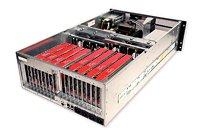- Joined
- Oct 9, 2007
- Messages
- 47,205 (7.56/day)
- Location
- Hyderabad, India
| System Name | RBMK-1000 |
|---|---|
| Processor | AMD Ryzen 7 5700G |
| Motherboard | ASUS ROG Strix B450-E Gaming |
| Cooling | DeepCool Gammax L240 V2 |
| Memory | 2x 8GB G.Skill Sniper X |
| Video Card(s) | Palit GeForce RTX 2080 SUPER GameRock |
| Storage | Western Digital Black NVMe 512GB |
| Display(s) | BenQ 1440p 60 Hz 27-inch |
| Case | Corsair Carbide 100R |
| Audio Device(s) | ASUS SupremeFX S1220A |
| Power Supply | Cooler Master MWE Gold 650W |
| Mouse | ASUS ROG Strix Impact |
| Keyboard | Gamdias Hermes E2 |
| Software | Windows 11 Pro |
At today's Xilinx Developer Forum in San Jose, Calif., our CEO, Victor Peng was joined by the AMD CTO Mark Papermaster for a Guinness. But not the kind that comes in a pint - the kind that comes in a record book. The companies revealed the AMD and Xilinx have been jointly working to connect AMD EPYC CPUs and the new Xilinx Alveo line of acceleration cards for high-performance, real-time AI inference processing. To back it up, they revealed a world-record 30,000 images per-second inference throughput!
The impressive system, which will be featured in the Alveo ecosystem zone at XDF today, leverages two AMD EPYC 7551 server CPUs with its industry-leading PCIe connectivity, along with eight of the freshly-announced Xilinx Alveo U250 acceleration cards. The inference performance is powered by Xilinx ML Suite, which allows developers to optimize and deploy accelerated inference and supports numerous machine learning frameworks such as TensorFlow. The benchmark was performed on GoogLeNet, a widely used convolutional neural network.


AMD and Xilinx have shared a common vision around the evolution of computing to heterogeneous system architecture and have a long history of technical collaboration. Both companies have optimized drivers and tuned the performance for interoperability between AMD EPYC CPUs with Xilinx FPGAs. We are also collaborating with others in the industry on cache coherent interconnect for accelerators (the CCIX Consortium - pronounced "see-six"), focused on enabling cache coherency and shared memory across multiple processors.
AMD EPYC is the perfect CPU platform for accelerating artificial intelligence and high- performance computing workloads. With 32 cores, 64 threads, 8 memory channels with up to 2 TB of memory per socket, and 128 PCIe lanes coupled with the industry's first hardware-embedded x86 server security solution, EPYC is designed to deliver the memory capacity, bandwidth, and processor cores to efficiently run memory-intensive workloads commonly seen with AI and HPC. With EPYC, customers can collect and analyze larger data sets much faster, helping them significantly accelerate complex problems.
Xilinx and AMD see a bright future in their technology collaboration. There is strong alignment in our roadmaps that align the high-performance AMD EPYC server and graphics processors with Xilinx acceleration platforms across its Alveo accelerator cards, as well as its forthcoming Versal portfolio.
So, raise a pint to the future of AI inference and innovation for heterogeneous computing platforms. And don't forget to stop by and see the system in action in the Alveo ecosystem zone at the Fairmont hotel.
View at TechPowerUp Main Site
The impressive system, which will be featured in the Alveo ecosystem zone at XDF today, leverages two AMD EPYC 7551 server CPUs with its industry-leading PCIe connectivity, along with eight of the freshly-announced Xilinx Alveo U250 acceleration cards. The inference performance is powered by Xilinx ML Suite, which allows developers to optimize and deploy accelerated inference and supports numerous machine learning frameworks such as TensorFlow. The benchmark was performed on GoogLeNet, a widely used convolutional neural network.


AMD and Xilinx have shared a common vision around the evolution of computing to heterogeneous system architecture and have a long history of technical collaboration. Both companies have optimized drivers and tuned the performance for interoperability between AMD EPYC CPUs with Xilinx FPGAs. We are also collaborating with others in the industry on cache coherent interconnect for accelerators (the CCIX Consortium - pronounced "see-six"), focused on enabling cache coherency and shared memory across multiple processors.
AMD EPYC is the perfect CPU platform for accelerating artificial intelligence and high- performance computing workloads. With 32 cores, 64 threads, 8 memory channels with up to 2 TB of memory per socket, and 128 PCIe lanes coupled with the industry's first hardware-embedded x86 server security solution, EPYC is designed to deliver the memory capacity, bandwidth, and processor cores to efficiently run memory-intensive workloads commonly seen with AI and HPC. With EPYC, customers can collect and analyze larger data sets much faster, helping them significantly accelerate complex problems.
Xilinx and AMD see a bright future in their technology collaboration. There is strong alignment in our roadmaps that align the high-performance AMD EPYC server and graphics processors with Xilinx acceleration platforms across its Alveo accelerator cards, as well as its forthcoming Versal portfolio.
So, raise a pint to the future of AI inference and innovation for heterogeneous computing platforms. And don't forget to stop by and see the system in action in the Alveo ecosystem zone at the Fairmont hotel.
View at TechPowerUp Main Site





